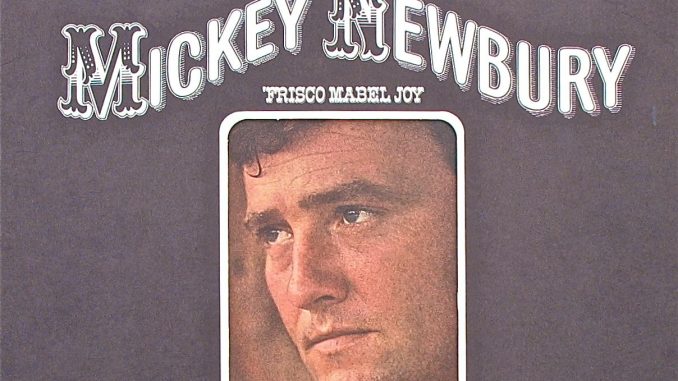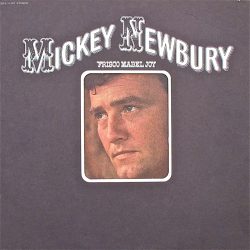
“He was my hero and still is. I learned more about songwriting from him than any other writer”.
 An eye catching quote and an accolade that any songwriter would be proud to be the recipient of, but only when you realise that these words belong to none other than the legendary songwriter Kris Kristofferson do you fully appreciate their value and the kudos of which Mickey Newbury was held amongst his fellow songwriters.
An eye catching quote and an accolade that any songwriter would be proud to be the recipient of, but only when you realise that these words belong to none other than the legendary songwriter Kris Kristofferson do you fully appreciate their value and the kudos of which Mickey Newbury was held amongst his fellow songwriters.
Born in 1940, and raised in Houston Texas, by the time he was in his early teens Newbury was already shutting himself in his room writing poetry and learning to play guitar. During this time he formed a doo-wop group called The Embers, achieving a modicum of success before leaving school in 1959 and joining the US Air Force where he was assigned to the UK for three years. On his return to the US, he set about pursuing his dream of being a songwriter, spending time initially around Texas, Tennessee, and Louisiana before eventually gravitating to Nashville where he signed a publishing contract with Acuff-Rose. From there it wouldn’t be long before a string of well known artist would be having major chart success with Newbury’s songs including, Tom Jones with, ‘Funny Familiar Forgotten Feelings’, First Edition and, ‘Just Dropped In’, Solomon Burke’s version of, ‘Time is a Thief’, and Eddy Arnold with, ‘Here Comes The Rain Baby’. The result of this phenomenal success was a solo deal with RCA and the recording of his first album, ‘Harlequin Melodies’, which included many of the previous hits as well a few new instant classics and should have been a massive success. The fact that it wasn’t can be greatly attributed to the over the top, excessive production full of distracting instrumental touches, shifting tempos and weird sound effects, completely overshadowing the subtle layers and emotional connection that each song had to offer. Newbury himself was so distraught with the finished result that he pretty much disowned the album and quickly extracted himself from the RCA contact.
Newbury would now sign with Mercury, which enabled him to work with good friends Jerry Kennedy and Bob Beckham, with his studio of choice being Cinderella Sound run by Wayne Moss, guitarist and founder member of Area Code 615. It would be here between 1969 and 1973, that Newbury would record a trilogy of albums that would raise the bar for the songwriting fraternity and become the gauge by which everything else would be measured. The first, ‘Looks Like Rain’, through to the third, ‘Heaven Help The Child’, are both classics in their own right, stuffed full of songs that would be covered over and over again by artist from all musical genres, and each should have their own page in this feature. However, for now it is the second album that I have chosen to focus on, if only because it would become Newbury’s most commercially successful album.
‘Frisco Mabel Joy’, was recorded and released in 1971, with a supporting cast of some of Nashville’s finest including Charlie McCoy, Dennis Linde, Jimmy Capps, Buddy Spicher, as well as Moss. The album’s opens with, ‘An American Trilogy’, a song that is actually a medley of tunes that date back to the 19th century, ‘Dixie’, ‘All My Trials’, and, ‘The Battle Hymn Of The Republic’. with Newbury apparently being moved to record the song as a protest against censorship. It would go on to be Newbury’s highest charting single achieving the lofty position of number 26 in Billboards Top 100, considerably higher than Elvis Presley’s cover which would only reach number 66, though it would go on to become a grandiose highlight in his live shows thus gaining the song worldwide exposure. Despite that Newbury was always underwhelmed by Presley’s version stating, “I thought Elvis kind of missed the point”. The following track, ‘How Many Times (Must The Piper Be Paid For His Song)’, first appeared on the debut album but here it is dramatically reimagined. Gone are the weird sound effects and the awkward time signature that suffocated the song and instead here a simple nylon string guitar is gently plucked beneath the vocals, gradually expanding until it soars, freed from it’s shackles, while the lyrical poetic lines such as, “the dew was like a diamond necklace scattered on the grass”, create an imagery so clear yet still shrouded in mist, in mystery. Another highlight is, ‘The Future’s Not What it Used To Be’, opening to the sound of heavy rain tumbling on to the roof tops. During this period Newbury lived on a houseboat on Old Hickory Lake just outside Nashville where he remembered, “It seemed to rain all the time back then”, and the melancholy rhythm seemed to seep into his subconscious and permeated his work. It is also true that Newbury suffered from depression throughout his life and later reflected, “How many people have listened to my songs and thought, he must have a bottle of whisky in one hand and a pistol in the other. Well I don’t. I write my sadness”. Here, on this classic track, the future can’t compete with the past, not because the past was so special, but the realisation and acceptance that it in fact it wasn’t.
Another of Newbury’s great admirers is Gretchen Peters, one of the finest singer songwriters of the past thirty years and an inductee in the Songwriters Hall of Fame. Peters recently recorded a whole album of Newbury’s songs entitled, ‘The Night You Wrote That Song’, of which, ‘Frisco Depot’, originally came from this album, and had this to say about the great man, “Besides being a brilliant songwriter, he was a world class singer and a great guitar player”, and continued, “Newbury had a profound influence on me as a young songwriter”. From someone such as Peters this has the same resonance as Kristofferson’s tribute and coming from different generations helps highlight the impact Newbury’s music continues to have throughout the last fifty years. The next track on the album is, ‘You’re Not My Same Sweet Baby’, and here again Newbury mines a dark seam with heart aching lyrics of love lost, “I’ll just be packing my bags and silently gone”. Not leave, but gone. So much more permanent. Townes Van Zandt was greatly influenced by Newbury, and the way his lyrics carry a certain darkness and poignancy rather than bitterness, but there is also an underlying sense of spirituality not to dissimilar to what Gene Clark would deliver a few years later with his classic, ‘No Other’. As the album draws to a close we get the sublime, ‘Swiss Cottage Place’, with the opening line, “I turned down the covers on a bed where two lovers found reasons to face each new day”, exquisitely emphasising the power and the subtlety, the emptiness and the hope, or at least reason for hope, all within a few words. A line. The album closes with, ‘How I Love Them Old Songs’, an upbeat finale song with a honky tonk piano taking the lead, but just as you think the album’s reached a happy ending, McCoy appears with his harmonica and blows a lonesome sobering reminder over the last few bars.
Frisco Mabel Joy would be Newbury’s most successful album, but that success is relative, though to be fair Newbury was never too concerned with commercial success. He loved the music, he did not love the music business, and though he would continue to release some wonderful albums through the following thirty years his priorities were shifting. He was a proud family man, a husband and a father. Unfortunately his life would be cut short after a long battle with emphysema and he passed away on 29th September 2002 at the age of 62.
His legacy however lives on, with over 1,500 cover versions of his songs recorded across many genres of music by such artists as Johnny Cash to Vampire Weekend, Ray Charles to John Denver, Joan Baez to B.B. King the list is endless the influence immense. However, I will the leave the last word to a man who, it could be said was his equal. During a live show in Galway, John Prine was quoted as saying, “Mickey Newbury is probably the best songwriter ever”. Who would be more qualified to know!



I love your understanding of what was important to him, and the recognition of how wide his influence has been. Long live the music.
Susan Newbury
Thank you Susan for your kind words, they mean a lot. Mickey’s music has been for many years and continues to be a big part of my live, and I very much wanted to do him and the album justice in the article. As long as I have a voice I will continue to spread the word. Long live the music.